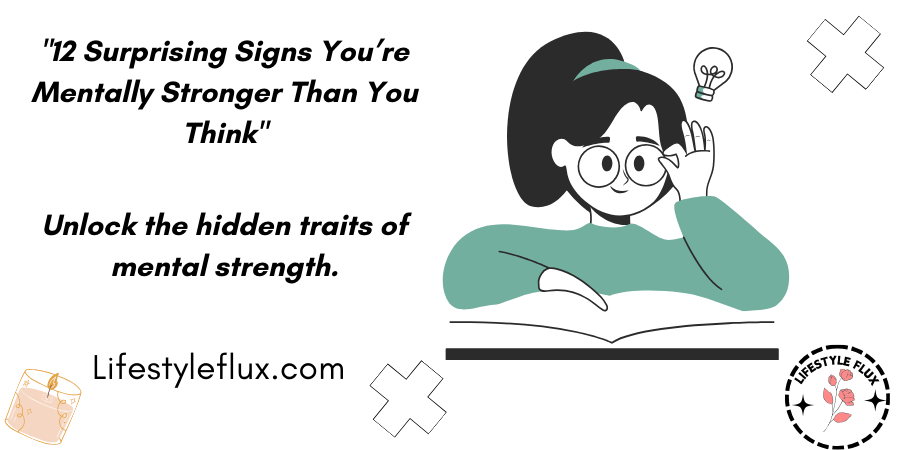Have you ever wondered if you’re mentally stronger than you give yourself credit for? Mental strength often reveals itself in subtle, surprising ways—ways you might not even notice in your day-to-day life. In 12 Surprising Signs, You’re Mentally Stronger Than You Think, we dive into the traits and habits that signal a robust mind, from self-control and emotional clarity to advanced decision-making and perseverance. Whether you’re resisting temptation, managing stress, or planning, these signs might prove that your mental fortitude is stronger than you realize. Let’s explore what it truly means to have a resilient mind and how to harness these strengths to thrive.
Table of Contents
1. Cool Traits
The most important element of cool traits is a strong mind, specifically self-control. It’s your ability to set aside your immediate interests in favor of something more meaningful.
So, whether you’re avoiding fast food to lose weight or saving money to buy a car, self-control makes those long-term goals possible. But how does it work?
Scientists explain self-control as a “hot and cool” system. One part of your brain—the hot system—is impulsive and passionate. It acts on urges and seeks out short-term rewards.
The other part—the cool system—is logical and cognitive. It thinks through problems and tries to figure out the best course of action. Your self-control depends on the dynamic between these two systems.

If your hot system is stronger, self-control is probably difficult for you. But if your cool system has the upper hand, you’re much better at resisting temptation.
So, how can you tell which system is stronger? Those hot and cool traits are often reflected in your personality. If you have strong willpower, you’re more careful and analytical.
You reason problems out over time instead of making impulsive decisions. If this sounds like you, you may have more willpower than you realize.
2. Zero Hot Triggers
Some people have dominant cool systems 95% of the time, but then they lose control around certain temptations. These are called hot stimuli or triggers.
No matter how logical you are, a hot trigger can still provoke that passionate, impulsive side of your brain.

Obviously, this can be a huge inconvenience. Knowing you have certain triggers will motivate you to avoid those stimuli. Yet, you might have to change or cancel plans simply because you know you can’t resist.
If you’re able to identify and eliminate your hot triggers, that’s an obvious sign of great self-control.
3. Childhood Control
An influential study on human willpower tested how well children could control themselves around sweets. In this study, researchers gave each kid a marshmallow and asked them not to eat it while the researcher left the room.
If they succeeded, the kid would get two marshmallows when the researcher returned. If not, they would only get one. Nearly four decades later, another study tested the same group of kids to see if their willpower held up over time.
To their surprise, their performances were almost identical. The kids who showed self-control with the marshmallow ended up scoring higher on willpower tests than adults.
What does this mean for us? Their findings show that developing discipline and willpower when you’re younger carries over into your adult years. So, if you had great self-control as a child, your willpower is likely above average today.
4. Internal Willpower
Let’s say you resist the urge to buy yourself a new watch. Why didn’t you go through with it? Was it because you didn’t have enough money, or did you think that purchase was fundamentally a bad idea?
If you choose the latter, it means you’re using internal willpower instead of external willpower. They look the same on the surface, but internal willpower is significantly more effective in the long term. Imagine that after resisting the urge to buy the watch, you come across another tempting item that you can afford.
You won’t have any way to stop yourself because you drained all your external willpower the first time around. This is called willpower depletion. Anytime you spend a considerable amount of energy avoiding something, it becomes even more difficult to resist additional triggers.
But there is one way to dramatically reduce depletion. Researchers found that it takes much less internal willpower to resist a stimulus. If you’re motivated by your values, beliefs, and morals, you’ll have an easier time avoiding temptations of all shapes and sizes.
5. Baseline Stress
How much pressure are you under on a daily basis? Are you generally high-strung or more relaxed? Your willpower can fluctuate based on your daily stress levels.
One study showed that significant stress reduces self-control. It clouds judgment and leads to impulsivity.
Your brain will also crave short-term rewards. It wants to relieve all those negative emotions created by stress, which means you have a harder time avoiding your usual temptations.
6. Implementation Intentions
Without realizing it, people with strong willpower use a trick recommended by psychologists around the world. It’s called an implementation intention, but you probably know it as an “if-then” statement.
For example, let’s say you’re going to a mall with your friends. You know ice cream is a major trigger for you, so you plan ahead. You say, “If I pass by an ice cream parlor, then I will eat a banana instead.” These statements increase self-control by giving you something active to do in place of your temptation.
Eating a banana is a great substitute for ice cream because it provides a healthy alternative to the same activity—you’re eating something sweet while completely shutting down your trigger.
7. Willpower Tests
You can’t spend your entire life avoiding temptation, though many people have tried. The problem is that living temptation-free isn’t the same thing as building willpower.
All you’re really doing is avoiding your triggers. If one does pop up somehow, you’ll be completely defenceless.
The key to strong willpower is consistent testing. In other words, you have to let yourself make contact with your triggers. Yes, it’ll be hard to resist at first, but the more times you do it, the more resilient you’ll get.
An obvious sign that someone has strong willpower is that they can freely interact with things that used to trigger them. Over time, they use small bursts of exposure to test their self-control until, suddenly, those triggers start to disappear.
Just keep in mind that willpower depletion can happen if you’re testing yourself too often. Think about willpower like any other muscle in your body. Regular exercise is healthy, but don’t overdo it.
8. Vivid Imagination
Your imagination is an incredibly useful tool for resisting temptation. You can actually trick your mind into satisfying a craving using only your imagination. There are a few different ways to do this, but let’s focus on one for now.
In one study, researchers measured the impact of imagination on cravings for junk food, specifically cookies. They asked three groups of people to imagine three different scenarios:
- You’re craving cookies right now.
- You don’t care when you eat cookies; you know you want them.
- You don’t want any cookies now, but you do want them later.
Surprisingly, this small change had a huge impact on the number of cookies each participant ate when offered as many as they wanted.
The first two groups ate significantly more than the third, all because they stifled their craving using their imagination. So, if you have an especially creative mind, your vivid imagination might be boosting your willpower.
9. Persevering Attitude
Willpower comes naturally to people who regularly practice perseverance. When you refuse to give up on something, you’re training your brain to push through negativity.
That’s what self-control is: you need to experience negativity now to reap the rewards later. By maintaining a persevering attitude, you’ve been unconsciously exercising your willpower.
10. Advanced Decision-Making
Even the most insignificant choices can drain your willpower. That’s why people with great self-control often plan their decisions ahead of time. For example, you might orchestrate your meals, clothing, or budget the night before. Not only are you saving yourself some time, but you’re also doing your willpower a huge favour.
Normally, when temptation comes knocking, you have to make a choice right then and there: resist or give in. But planning ahead takes the pressure off your brain.
You’ve already made the decision, organized how the interaction is going to play out, and done the hard work. So, in the present, you can stick to the plan.
If you’re the kind of person who can’t resist mapping out your life, willpower is one of your strong suits.
11. Emotional Clarity
Bad moods are a universal scapegoat when you cheat on your diet or skip the gym. It’s true that stress and anxiety temporarily decrease self-control, but your mood is not the reason why you lack willpower.
Many people blame their mistakes on their mood when, in reality, they’ve never practised any self-discipline. That’s why, if you have strong willpower, you’re likely an emotionally intelligent person.

You know how to manage your own emotions. If something’s wrong, you try to get to the root of the problem instead of passing the blame.
By addressing your negative emotions, you’re building self-discipline and willpower. You’re training yourself to find long-term solutions to your problems rather than suppressing them with short-term rewards.
12. Perfection Control
Perfection and willpower are natural enemies. In fact, perfectionism often stems from a basic lack of self-control. You overwork and overthink because you can’t control that urge to keep tinkering.

Most people don’t realize that work can be a trigger, just like junk food or watching TV. That’s why people who have overcome perfectionism tend to have strong willpower. They’ve learned when to keep working and when to take a step back.
Conclusion:
Mental strength isn’t about being invincible or never facing challenges—it’s about how you respond to those challenges. From mastering self-control to maintaining emotional clarity, the signs of mental strength are often hidden in your small, everyday choices.
By recognizing these traits in yourself, you can build on them to create a more disciplined, resilient, and fulfilling life.
So, the next time you resist temptation, push through a tough situation, or plan to avoid pitfalls, remember that you’re demonstrating mental strength in ways you might not even realize. Keep nurturing these habits, and you’ll grow stronger, one decision at a time.
Sources:
https://www.apa.org/topics/personality/willpower
https://pubmed.ncbi.nlm.nih.gov/10197361
https://pubmed.ncbi.nlm.nih.gov/21876169
https://pubmed.ncbi.nlm.nih.gov/21980159
https://pmc.ncbi.nlm.nih.gov/articles/PMC2516342
https://pubmed.ncbi.nlm.nih.gov/11273412
https://pubmed.ncbi.nlm.nih.gov/17032494
https://www.psychologytoday.com/us/blog/good-thinking/201306/how-boost-your-willpower
https://www.inc.com/jeff-haden/5-habits-of-people-with-remarkable-willpower.html
https://www.huffpost.com/entry/success-and-motivation_b_4170196

Founder and CEO of Lifestyleflux.com, I bring years of expertise in self-improvement, wellness, and personal development to help you lead a happier, more balanced life. Through practical insights, eBooks, and consultations, I share actionable strategies rooted in experience and a passion for empowering others to unlock their full potential.

